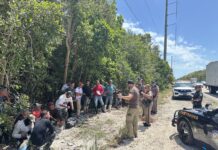Florida Keys leaders have 10 months to respond to the state on which hurricane evacuation model is best for the island chain, a decision linked to the number of new building permits that could be made available.
So from Key Largo to Key West, anyone who has a stake in development, environmental protection, public safety and quality of life issues, has work to do.
Next week, the Monroe County Board of County Commissioners will hold a workshop dedicated to the Rate-of-Growth Ordinance issues at hand that dictate development in the Keys. County staff will make presentations and hear public comment.
“This is the kickoff,” acting County Administrator Kevin Wilson told Keys Weekly. “The intent is mostly educational. Everybody seems to have their own idea. There’s a lot of mythology out there. Some people want more ROGOs. Some people don’t want any more.”
The ROGO workshop is set for 10 a.m. to noon on Wednesday, March 20 at the Murray Nelson Government Center in Key Largo. The board’s regular meeting will follow at 1 p.m.
For starters, county staff has been working to quantify exactly how many vacant lots remain in the Keys – the total from both the five municipalities and unincorporated Monroe.
“We’ve heard everything from zero to 8,000 or so,” Wilson said. “One of the problems is everybody gets a number fixed in their head. Nobody has honest support for that number. This meeting is specifically to get the facts on the table.”
Then there’s the question of how many lots are realistically developable, keeping in mind the threat of takings lawsuits.
The Rate-of-Growth Ordinance, or ROGO, exists to control development in the fragile Keys environment to protect residents in the event of a hurricane evacuation.
In November, FloridaCommerce gave Monroe County a list of options for hurricane evacuation plans, all tied to the possibility of adding perhaps 3,550, or up to nearly 8,000, ROGO allocations to the Keys. The BOCC asked for a year to work on a response.
“When we first got this news in November, we had that sinking feeling in our stomachs,” said County Commissioner Michelle Lincoln, of Marathon. “Now, I’m excited. Our county has the best expertise than anyone else’s I’ve ever encountered.”
The ROGO workshop will offer new findings from the planning department, plus tutorials on legal definitions and the type of litigation looming over the Keys when it comes to property ownership and development rights.
The March 20 workshop is just the start of a series of public meetings among Keys leaders on the evacuation model and ROGO issues. Much more will have to be hashed out, Lincoln said.
“We’ll have more questions than answers,” Lincoln predicted. “We cannot make this decision as just a county. It will require every municipality to also weigh in.”
All of the Keys’ leaders want to make sure they’re on the same page.
“Marathon’s size of a buildable lot is different from the county’s,” Lincoln said, as an example. “We want to make sure everyone in our community knows what a ROGO is, knows what the legal risks are in a takings case.”
Emily Schemper, the county’s planning and environmental resources director, will make a presentation and Assistant County Attorney Derek Howard will explain takings case law.
“He has defended the state against takings cases,” Lincoln said, of Howard. “He has a master’s in community planning. He is totally versed in what we’re up against.”
What appears to some as a defining turn for the Keys is simply another job, however complex, for county government to accomplish, Wilson said.
“I wouldn’t be that dramatic about it,” Wilson told Keys Weekly. “Like many other things we’ve faced, this is another challenge for this community. Everybody in this community will pull together and we’ll come up with a common objective, a common mission and we’ll get it done.”
The daunting Keyswide issue reminds Wilson of the ongoing project he signed on for when he started working for the county in 2010: Monroe County’s sewer program.
“That started way before I got here, in 1999,” Wilson said. “When we finished in 2018, everybody in this community had pulled up their socks and said we’re going to do this. Now the entire community is centrally sewered.”






















